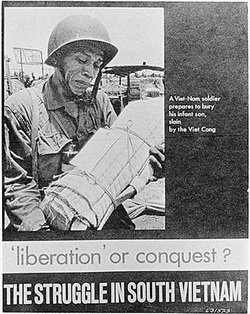Contrary to popular belief, the Vietnam War was much more than blood and guts to the American soldiers. As you can imagine, once the soldiers had been in combat for an extended period of time, they were eager to come home. As members of a soldiers troop came home, they would write to their fellow troop members who were till in Vietnam. One veteran said that every time a member of their troop went home, they would receive three letters. The first letter was very enthusiastic; it was evident that the soldier was ecstatic to be home. The second letter was still positive, but there was an evident decrease in the excitement. Last, there was a third letter which stated that the soldier could no longer talk about life at home anymore, and that would be the end of communication between the troops. As the veteran told this story he said that at the time, he could not understand why this happened every time a member of his troop returned home, but when he was fortunate enough to return home the reason was evident.
"How Many people did you Kill?"

Sergeant Ernie Ross assists a Vietnamese child with a skin infection.
A collection of responses from Vietnam war veterans showed that the most difficult thing about coming home was the ignorance in America. It seemed as though there was a glorification of blood and guts. On veteran said that he came home with the intention to "set the record straight" about the facts of the war, and of course he tried but the ignorance of America seemed to get in the way. He put together a PowerPoint with all of his pictures and set out on his mission. He wanted to show that during his time in Vietnam he did much more that fight in the war, he along with his troops spent a large majority of their free time helping Vietnamese civilians (Covell). Covell came home armed to change the world's perspective of war, but time after time, when his presentation come to a close someone would always ask the question. "How many people did you kill?" To this day Covell still refuses to answer this question because it is entirely too personal and he believes that the answer is not significant part of war in comparison to all the community service he served. The obsession that America has with body count was "disheartening" to Covell. Covell was not the only veteran who dedicated much time to give aid to the Vietnamese civilians (Covell).
"Winning Hearts and Minds"

Members of 1ATF deliver food to a local village of Vietnamese people.
Many veterans will attest that along with fighting the Viet Cong a major part of the Vietnam War was gaining the trust of the civilians. The key to winning the war was to win the hearts as well as the minds of the Vietnamese people. Soldiers set out to help the Vietnamese people by providing medical aid, as well as dental aid in some cases (Lipps). Soldiers also spent a large majority of their free time helping the Vietnamese rebuild schools as well as houses. All of this was in effort to win the hearts of the Vietnamese people who had been directly affected by the Viet Cong. Proving that America was in Vietnam to help not to hurt was one of the biggest hurdles that the soldiers faced while they were in Vietnam, as well as when they returned home (Lipps).
This concept is incomprehensible to those who have not fought in the war. The idea seems so foreign and the fact that American citizens are unable to come to terms with the truth about war is increasingly frustrating to Veterans of the Vietnam War.
Vietnam War Propganda

The glorification of blood and guts was intensified by propaganda. The press put emphasis on the amount of people who were dying, both Vietnamese and American, and shied away from the countless number of good deeds that the soldiers were taking part in during the war (Shah). One of the reason that soldiers found it so hard to continue to write to their fellow troop members once they returned home was because of the inaccurate portrayal of the war through the American press. On veteran said that the reportings of the war was extremely poor because the focus is on the bad and not the good, which defeats the purpose of the war (Shah).
Propaganda aided the American people to be ignorant to the truth about war. There is no way to imagine the brutalities of war but propaganda played a huge role in further altering the public opinion of the war. One Veteran talked about his frustrating with the American press when he returned home when he said, "People do not understand how horrific it is, so they try to make irrational connections" (Covell). Propaganda is a true reflection of American attempting to make irrational connections. Without going through war it is impossible to imagine the truth about it, and propaganda further altered the American opinion of war.

